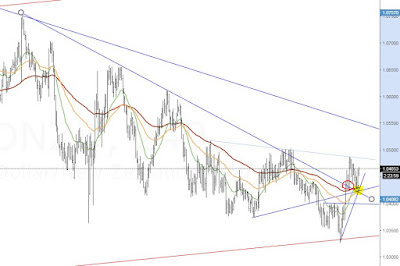How to trade
“I have not failed. I have just found 10,000 ways that won’t work.” – Thomas Edison
I don't know about you fellow traders out there, but that is certainly how I feel about my beginnings in the financial markets. It all sounds so simple. You open almost any book about trading and read about how putting an indicatior on your chart can give you entries and exits and will make you rich. Excited about the insight you pull up your chart software and start seeing the described entries all over the place. No way to lose money with this knowledge, right? Well, it's not that easy. And how could it be? Do you really think something like "the 20 period moving average acts as support" is the essence of investing? Huh?? I mean, come on folks! It might work a few times, it might even work in the long run for some people. But the truth is: what these technical, indicator-driven strategies try to do is to exploit a statistical abnormality. Following these rules religiously is very tough intellectually. Because it is precisely the opposite - not intellectual at all. Anyway, it never worked for me. Nor would I want it to work for me. If life was that simple we would not have a brain.
So what's the alternative? Where can I find an edge in trading which does not rely on statistical advantages derived from a necessarily limited set of past data? There are a few places to turn to. The most obvious is of course fundamental analysis. The argument of technical vs. fundamental analysis has long been ongoing (form what I read). Does that mean I am a fundamental trader? No. Does it mean I try to watch and interpret fundamental developments? Definitely yes. In the long run, they work. But that does not mean you can make money off of them disregarding all other means. After all, you can be right about a fundamental interpretation, but still you need to translate your idea into proper trades. Pick an appropriate instrument, for example. Have proper timing.
As for my additional trading edges, here are some:
Patience: Give the market time to offer good entries and also give your positions time to mature into profits.
Carry: The positive carry of a position is more or less a fundamental argument, I still list it here explicitely because it is so important.
Imprecision: Don't expect you have found the holy grail of trading, being able to tell the difference between a bull or a bear market by a pip or two (which you actually do as soon as you set a stop-loss). Expect volatility, market noise, whatever you want to call it.
Low Leverage: This might be the most important point of all. The understanding and appropriate application of leverage can be pivotal for the survival of your trading account. Use it wisely and err to the low side!
I don't know about you fellow traders out there, but that is certainly how I feel about my beginnings in the financial markets. It all sounds so simple. You open almost any book about trading and read about how putting an indicatior on your chart can give you entries and exits and will make you rich. Excited about the insight you pull up your chart software and start seeing the described entries all over the place. No way to lose money with this knowledge, right? Well, it's not that easy. And how could it be? Do you really think something like "the 20 period moving average acts as support" is the essence of investing? Huh?? I mean, come on folks! It might work a few times, it might even work in the long run for some people. But the truth is: what these technical, indicator-driven strategies try to do is to exploit a statistical abnormality. Following these rules religiously is very tough intellectually. Because it is precisely the opposite - not intellectual at all. Anyway, it never worked for me. Nor would I want it to work for me. If life was that simple we would not have a brain.
So what's the alternative? Where can I find an edge in trading which does not rely on statistical advantages derived from a necessarily limited set of past data? There are a few places to turn to. The most obvious is of course fundamental analysis. The argument of technical vs. fundamental analysis has long been ongoing (form what I read). Does that mean I am a fundamental trader? No. Does it mean I try to watch and interpret fundamental developments? Definitely yes. In the long run, they work. But that does not mean you can make money off of them disregarding all other means. After all, you can be right about a fundamental interpretation, but still you need to translate your idea into proper trades. Pick an appropriate instrument, for example. Have proper timing.
As for my additional trading edges, here are some:
Patience: Give the market time to offer good entries and also give your positions time to mature into profits.
Carry: The positive carry of a position is more or less a fundamental argument, I still list it here explicitely because it is so important.
Imprecision: Don't expect you have found the holy grail of trading, being able to tell the difference between a bull or a bear market by a pip or two (which you actually do as soon as you set a stop-loss). Expect volatility, market noise, whatever you want to call it.
Low Leverage: This might be the most important point of all. The understanding and appropriate application of leverage can be pivotal for the survival of your trading account. Use it wisely and err to the low side!



Comments
Post a Comment